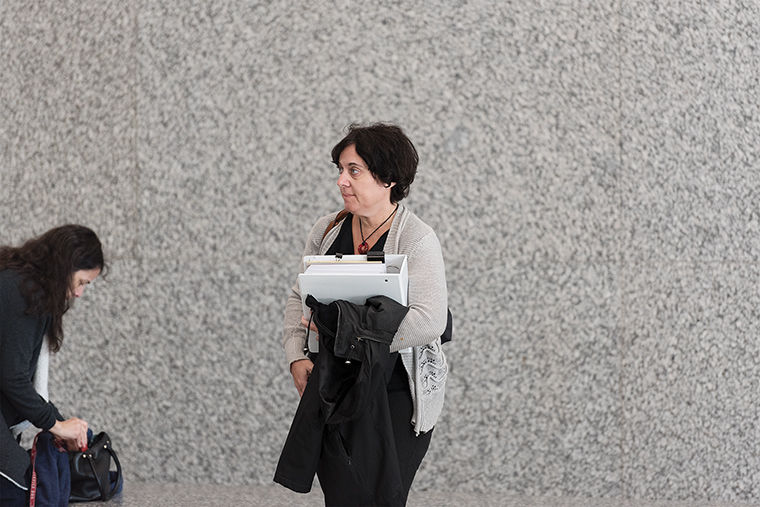Seventh Circuit Court decision limits P-Fac bargaining rights
February 13, 2017

A Seventh Circuit Court decision issued Feb. 2 limited bargaining rights for Columbia’s part-time faculty union, led by President and Associate Professor in the Photography Department Diana Vallera (pictured).
The U.S. Court of Appeals for the Seventh Circuit issued a decision Feb. 2 limiting post-contract bargaining rights for Columbia’s part-time faculty union and ordering other decisions back to the National Labor Relations Board for review.
The decision was issued after Columbia sought review of an earlier NLRB decision in P-Fac’s favor that required the college to bargain with P-Fac when dealing with the impact of credit-hour changes to the performing arts curriculum.
Called “effects bargaining,” the practice allows unions to negotiate the effects of management decisions made after and outside of traditional contract negotiations.
Historically, unions have “effects bargained” such critical management decisions as plant closings and employee layoffs.
According to the decision, the Collective Bargaining Agreement between P-Fac and the college permits Columbia to make decisions without having to bargain first with P-Fac, including decisions regarding its educational, fiscal and employment policies.
However, the court found Columbia is required to notify instructors of any relevant course changes.
During the Spring 2010 semester, Columbia made credit hour changes to 10 courses in the School of Fine & Performing Arts and notified the affected instructors, but not P-Fac.
In 2011, P-Fac learned about the changes, sought a list of the relevant courses from Columbia and demanded to bargain over the effects of the changes. The dispute came at a time when P-Fac was negotiating a new contract with the college, which sought to limit the union’s right to bargain over administrative decisions.
During this period, P-Fac and Columbia agreed to abide by the terms of the 2006 contract until the successor agreement was signed.
P-Fac expressed concerns about the proposal, saying it was a setback from previous agreements, and negotiations were halted for months.
Although the college notified P-Fac on Feb. 21, 2012, that it disagreed that it was obligated to bargain with P-Fac over the effects of the credit-hour changes, the two parties agreed May 4, 2012, to meet to further discuss the credit-hour reductions. They resumed bargaining in June 2012.
On August 28, 2012, the NLRB filed a complaint against the college alleging it violated sections of the National Labor Relations Act by failing to bargain over the effects of the credit-hour reductions, and not bargaining in good faith for a new CBA from January to June of 2012.
An administrative law judge for the NLRB ruled March 15, 2013 in P-Fac’s favor but did not issue remedies for the disputes.
“I cannot find… that [Columbia’s] misconduct was so aggravated as to infect the bargaining process to the point where traditional remedies would not be effective,” the judge said in the latest decision.
Columbia, P-Fac and the NLRB all filed appeals of this decision.
As reported April 11, 2016 by The Chronicle, the NLRB agreed March 24, 2016, with the decision made by the ALJ; however, it rewarded bargaining expenses to P-Fac.
A dissenting panel member argued that Columbia had not violated the NLRA because it was not required to bargain over the effects of the credit-hour changes.
The Seventh Circuit Court, in reviewing the decision, agreed that the college was not required to bargain over the effects of the credit-hour changes, citing the CBA that allowed Columbia management rights to make changes to courses.
“Reducing the number of credit hours for a course constitutes a modification or alteration of that course,” the court’s decision stated. “The management rights clause thus fully defined the parties’ rights with respect to course credit hour changes.”
Diana Vallera, P-Fac president and adjunct professor in the Photography Department, and Mike Persoon, P-Fac’s attorney at Despres, Schwartz & Geoghegan, Ltd., were not available for comment as of press time.
The court also noted that Columbia did not appeal the NLRB’s ruling over bad-faith bargaining.
“Columbia has not even challenged the Board’s findings that it violated the National Labor Relations Act by engaging in bad-faith bargaining,” the court said. “I agree that we must remand the remedial issue to the board. There was plenty of other egregious conduct by the employer here, however, and [the court’s opinion] leaves the Board ample discretion to impose that remedy again on remand.”
Whether the bargaining expenses awarded to P-Fac are still necessary was sent back to the NLRB for further reviews, according to the court decision.
“Because we conclude that Columbia was not obligated to engage in such bargaining, we vacate the award of bargaining expenses and remand back to the NLRB to decide whether such a remedy is still warranted in this case without considering the effects-bargaining behavior,” the court said.
According to a Feb. 10 statement from college spokeswoman Anjali Julka on behalf of Terrence Smith, special counsel for labor relations, the Circuit Court’s decision upheld the beliefs of the college and added that the college thinks it will not have to pay any expenses to P-Fac.
“The court’s decision upholds the college’s position that its actions were not in violation of federal labor law, and vacates the March 24, 2016 decision with respect to effects bargaining and its award of P-fac’s bargaining expenses,” the statement said. “Now that the Court has ruled the college had no obligation to engage in effects bargaining, it is the college’s position that there is no longer legal or factual support for the remedy imposed.”







